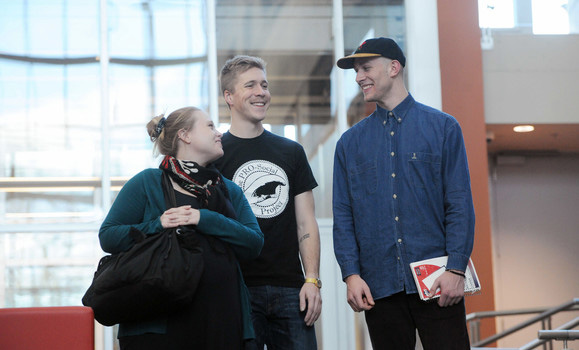Like most students, Jo Minx and Cole Wood see university life as an opportunity to have fun, try new things, and learn about themselves. As part of the PROsocial Project, however, they’ve also found a way to offer support to fellow students who find that challenges sometimes come along with these opportunities.
The PROsocial Project is a student-led group funded by that promotes a healthy social environment at HÂţ» with the goals of improving student mental health and reducing the harms caused by substance use.
The peer support offered through the project comes in several forms. On many Friday and Saturday nights, the PROsocial Project has been present at and around events where students gather, where they set up harm reduction booths and give out water, snacks, and friendly encouragement to party responsibly. The group has also developed and distributed material educating students on how to recognize and address potential mental health and substance abuse concerns in their friends.
“With the harm reduction booths, students really seem to love us and appreciate us.” says Jo, a Psychology and Sociology student. “It’s definitely helping people out and they definitely appreciate it.”
Forging connections
For Jo, the PROsocial Project is a natural extension of his academic studies as well as his interest in giving back to the university community. In addition to his work with fellow students, he’s also been deeply involved behind the scenes with the project’s twice-yearly student surveys, conducted in partnership with Dr. Sherry Stewart’s alcohol research lab in the Psychology and Neuroscience department.
“It definitely made sense to me as a Psychology and Sociology student,” he says of his participation.
The student leader team includes students from a broad range of programs. Music major Cole Wood is one such student. Cole, who lives off campus, was looking for an opportunity to get more meaningfully engaged with the Dal student community when he saw a student leader recruitment poster.
“I thought it would be a really good opportunity to get involved on campus and make a difference,” he says. “I liked the idea of being part of something new and having a leadership role in where the project would go.”
Parnell Davis-MacNevin, the PROsocial Project research coordinator, agrees that the student-led nature of the PROsocial Project differentiates it from other campus organizations.
“These guys developed (the PROsocial Project),” she says. “They created their brand and their image and their targets for this year.”

PROsocial students (left-to-right) Parnell Davis-McNevin, Jo Minx and Cole Wood.
Links to research
The Movember Canada grant’s co-principal investigators at HÂţ» are Dr. Stewart (Psychiatry and Psychology and Neuroscience) and Dr. Michael Teehan (Psychiatry).
“There are two main components to this project: the student-led initiatives and the research component,” says Dr. Stewart. “The research team supports the student leaders by giving them advice on what is known to work, to help ensure the chosen programming is evidence-based.”
Research associate Dr. Kara Thompson agrees that the partnership between the research team and the student leaders is key to the project’s success. “The research team will also be performing an evaluation of the project to see how well the student-led initiatives work”.
So far, Jo and Cole feel confident that the PROsocial Project is meeting its objectives to raise awareness and elevate the conversation about mental health and addiction around campus.
“I think we’re really bringing these topics to people’s attention, and awareness is so critical,” says Cole. “Our ideals of a safer campus are percolating down into the student mindset and I think we’re gradually making change.”
Cole adds that the connections the PROsocial Project has made with students across Dal’s campuses in Halifax and Truro is one of the rewards of the project – and one of the drivers of its success.
“Our success is coming from working together,” he says. “I feel like that’s such a big part of the strength of our project, being able to align and focus our interests.”
“I’m looking forward to what we can accomplish in the future.”
To learn more about the PROsocial Project you can and its .

